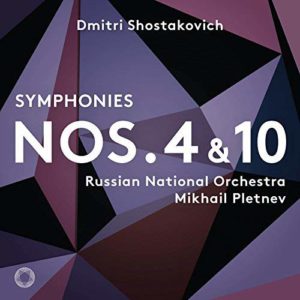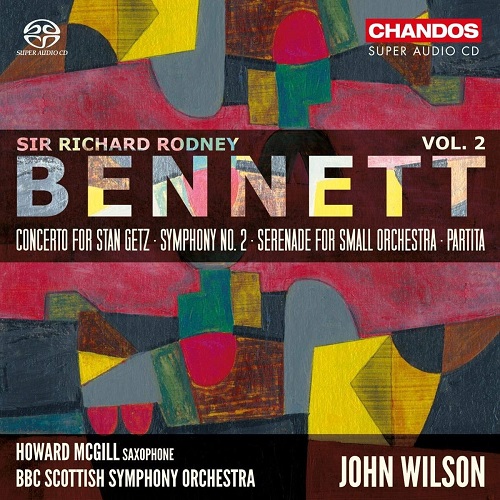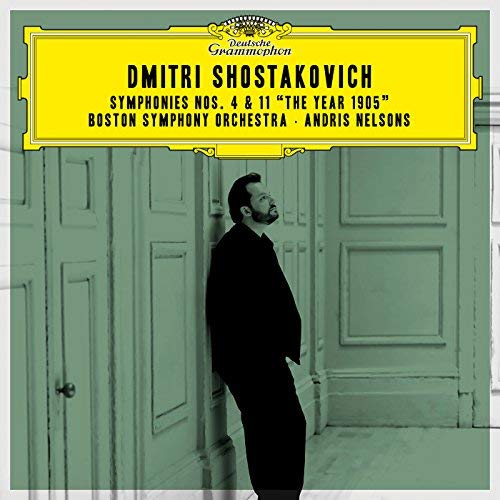GRAMOPHONE Review: Shostakovich Symphonies 4 & 10 – Russian National Orchestra/Pletnev
 You would expect Pletnev – a complicated and elusive character at the best of times – to offer a radical re-think of the renegade Fourth Symphony. And he does. Whether it works or not is another matter entirely and I suspect that only die-hard collectors of the wayward and eccentric will respond positively to it. At almost 75 minutes it’s probably the longest account on disc – an indication of Pletnev’s inquisitive nature and his tendency, indeed desire, to lose himself in the other-worldliness of this awfully big adventure. Shostakovich at some kind of crossroads.
You would expect Pletnev – a complicated and elusive character at the best of times – to offer a radical re-think of the renegade Fourth Symphony. And he does. Whether it works or not is another matter entirely and I suspect that only die-hard collectors of the wayward and eccentric will respond positively to it. At almost 75 minutes it’s probably the longest account on disc – an indication of Pletnev’s inquisitive nature and his tendency, indeed desire, to lose himself in the other-worldliness of this awfully big adventure. Shostakovich at some kind of crossroads.
The opening flourishes (rousing cheers or collective panic?) are oddly muted, the ensuing march almost comically deliberate. The tune sounds even more facile at this tempo (a point worth making) but I’d have thought that Pletnev would want to underline that with more not less from the xylophone (it has the tune after all) which is barely present in this mix. Taking the longer view of this sprawling first movement it’s almost as if Pletnev wants to play down its structural rigour in favour of the uncertainty of where the music might decide to go next. Again, you could argue, a point worth making.
The slower tempi certainly draw attention to all the work’s anomalies making it sound more not less episodic while also accentuating its searching nature. The best of this performance happens when the music is quietly mysterious – lost in time and space. The long lyric passage which comes in the wake of the introduction is truly strange and beautiful. One hears distant premonitions of the Fifth Symphony. Equally affecting is the painful oboe solo of the coda poetically recalling a motif one might have thought of little consequence.
The price one pays for Plentnev’s deliberation is a lack of tautness, of edge, of cynicism. In the second movement the tempo marking Moderato seems to mean something else entirely to Pletnev. But it’s not just the tempo but the woozy, heavy-limbed impression it conveys that I find disconcerting. It’s high on something or other and presumably it’s that hallucinatory, spaced-out quality that Pletnev wants to sustain right through to the iconic ticking percussion at the close. Clearly I’m trying very hard to give him the benefit of all my doubts.
An odd one, then. Time and again my listening notes refer to the need for keener focus and the edge which Pletnev and the highly cultivated Russian National Orchestra seem to deny rhythm and accenting. It diminishes the pungency of the circus-like divertissements in the third movement and blunts the impact of the huge anti-heroic climax towards the close where timpani and horns are hopelessly reticent.
That rather fleshy, well-upholstered, sound proves equally inappropriate as we step furtively into the shadowy opening pages of the Tenth Symphony. This pairing, of course, is all about Stalin’s all-pervasive climate of fear and loathing and Shostakovich’s creative response to it. Some regard the Tenth as his finest work and Pletnev certainly unfolds it with both reverence and cohesion. But there’s something about this almost Karajan-like plushness which diminishes the power of the message. Yes, there is the poetry of anxiety in those bass woodwind chorales and desolate piccolos in the coda, but the central climax is more monumental than it is trenchant and again trumpets and horns make little impression. The scherzo’s lean and ferocious depiction of Stalin’s brutal legacy is well-regimented but never dangerous. Where is the coarse military “rattle” of the side drum, the snap and roar of trombones? Virtuosity is one thing (this orchestra has it in spades) but if punches are pulled in the characterisation then we are nowhere dramatically. Just compare Nelsons and the Boston Symphony in this movement, indeed this symphony. Hair-raising.
And if we are seriously meant to feel the release of Stalin’s passing in the delirious coda of the finale – the composer’s musical monogram DSCH punching the air – then we certainly won’t do so with horns this feeble and rampant rhythms sounding like the message hasn’t yet come through that he’s gone.
Nelsons for the Tenth and Petrenko and the Royal Liverpool Philharmonic for the Fourth.
You May Also Like

MUSICALS Podcast: Edward Seckerson meets ZACHARY JAMES
06/03/2024
COMPARING NOTES: Vasily Petrenko in conversation
25/11/2020

